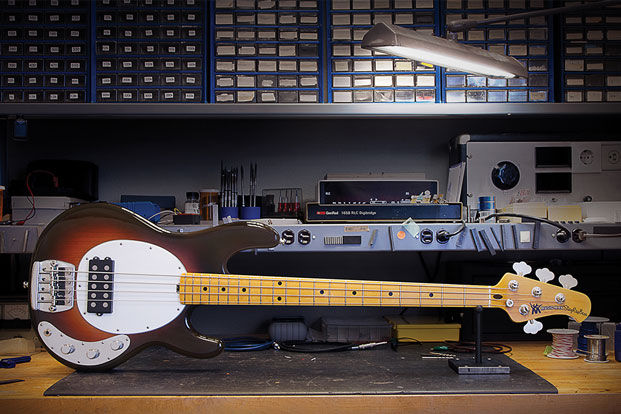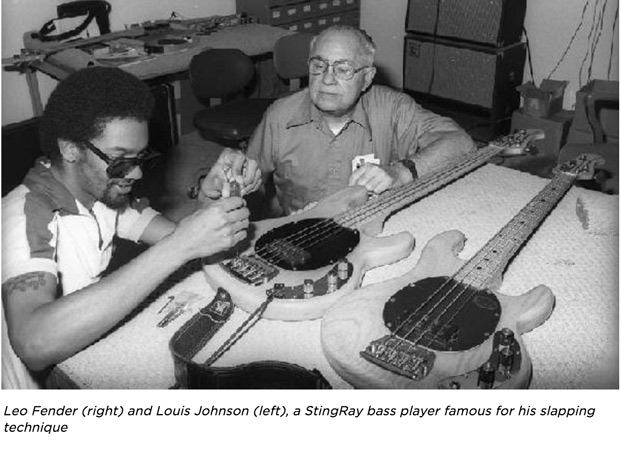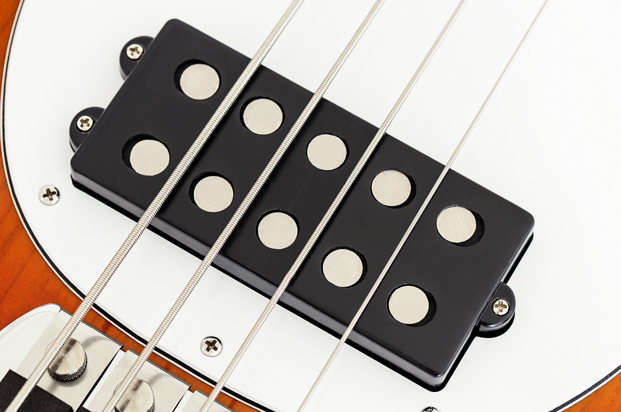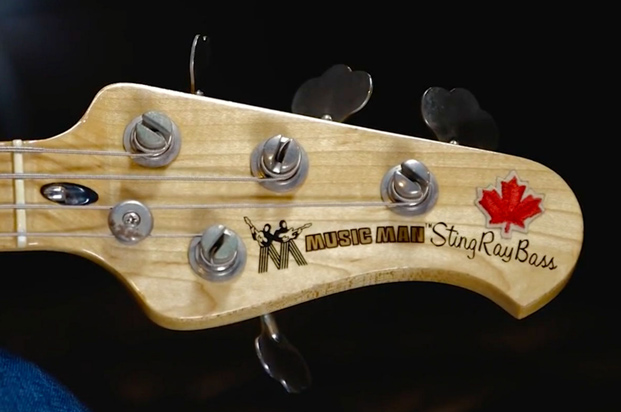History of the Ernie Ball Music Man Stingray Bass

The following column is from blog.music-man.com.
At the end of my teen years, I was one of Leo Fender’s beta testers. Back then, they didn’t call it beta testing, they called the process “bandstanding.” What it really meant was giving Leo your honest opinion about an electric guitar or bass after playing it live at your own shows and jams.
How did I get that gig? I grew up around Leo Fender and the Fender Company. My father was one of the original dealers and endorsees, and also did beta testing for Leo from the late 1940’s through the 1960’s. My godfather, Tommy Walker, was one of the original partners in Music Man.
I think that Leo used me for a few reasons. I was young and considered the “rock guy,” as most of Leo’s buddies were old country guys. But I think the biggest reason was that I wasn’t afraid to tell Leo what I thought.
Leo had the basic idea for the StingRay bass down. He wanted the 3+1 headstock for differentiation. He loved the big magnets and the Humbucking pickup. But what he really loved was that bridge with big stainless barrel saddles. When you visited “The Lab,” he would have you put a phillips screwdriver in the saddle and the pin end on the cartilage of your ear. Then, he would make you pluck the note to feel the vibrations through the screwdriver. It was really important to Leo to feel that string ring. See, Leo was hard of hearing and that’s why his 1970s guitars and basses were so bright. They sounded just fine to him. It turns out he was right by accident because slap bass was starting to get popular around that time.

So I would report back to Leo and Tommy, and they would proceed to argue about making changes. In many cases, I was the tiebreaker. In the case of the StingRay, I told them I thought the bass was super bright. It was also incredibly hot and overdrove the input stage of every amp. The huge magnets were so strong that when you played high up the neck, on the E + A strings, the magnets interrupted the vibration of the strings. We worked through most of those issues, but I still thought the bass was just a little too in-your-face aggressive. I brought in my old 58P bass and we compared that with the StingRay. Finally Leo said, “I have an idea, come back next week."
When I showed up, there was this bass with five sets of pole pieces in a raw body. The strings went in between the magnets instead of over, and both Leo and I loved it. Leo called it Old Smoothie.
Get The Pick Newsletter
All the latest guitar news, interviews, lessons, reviews, deals and more, direct to your inbox!

There was a lot of discussion around which bass should they release to the public. In the end, Leo hand-made me Old Smoothie with this odd-brownish burst color and a very thick, goopy finish on the neck – so much that it was nearly fretless. I didn’t care, I loved it. The only thing I added was a little cloth Canadian maple leaf fabric sticker on the headstock. I don’t know why I did or where I got it, but I thought it looked cool. I played that bass exclusively until our family bought Music Man.

ABOVE: The original Old Smoothie.
The original Old Smoothie lives in the vault and comes out sometimes during factory tours. We almost always got asked if we’d re-issue it. I always said no, until now. But, for the 40th anniversary of the StingRay, it just felt right.
When the engineers took the original apart so they could learn how to duplicate it, they discovered a note from Leo in the neck socket.
“For Sterling, from Leo.”
Doesn’t get better than that.
ERNIE BALL MUSIC MAN STINGRAY BASS | 40TH ANNIVERSARY
The 40th anniversary Ernie Ball Music Man StingRay bass is available for pre-order as of April 1, 2016. Watch Sterling tell the full story behind the StingRay bass design, listen to the demo video, and then head to our website to find a dealer: http://musc.mn/1RpppyJ
“An esoteric boutique vibe, superb ergonomics and a powerful, unique preamp – Tobias is back”: Tobias Growler IV review
“Affordable versions of the three best basses I've ever held in my hands”: Sterling by Music Man completes its trilogy of Joe Dart signature models with a trio of made-to-order basses that cost less than $500










